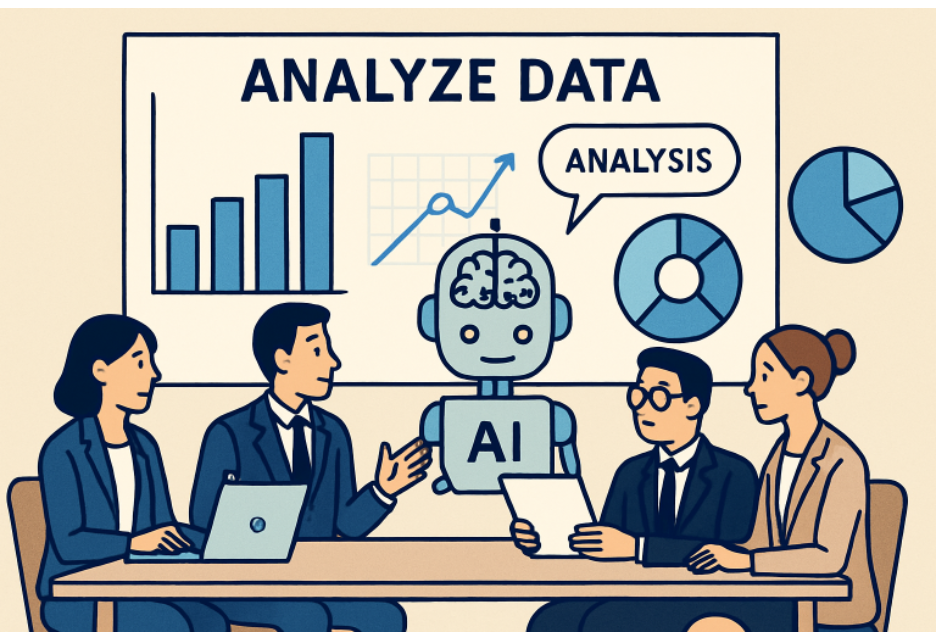In today’s data-driven world, making timely, informed decisions is critical to business success. Enterprise artificial intelligence (AI) is rapidly reshaping this process by enabling organizations to analyze vast amounts of information, uncover hidden patterns, and generate insights with unprecedented speed. Rather than relying solely on human intuition or traditional analytics, companies are turning to AI-powered tools to guide strategy, optimize operations, and anticipate future trends.
From healthcare and finance to manufacturing and retail, enterprise AI redefines how decisions are made across industries. It empowers leaders to move beyond reactive problem-solving toward proactive and predictive approaches. As AI continues to evolve, its role in decision-making is expanding, offering businesses greater efficiency and the ability to innovate and stay ahead in competitive markets.
Paving the Way for Data-Driven Decisions
Today’s rapidly evolving business climate demands split-second decision-making based on real-time data insights. Artificial Intelligence (AI) is a critical enabler, transforming how organizations consume and interpret vast volumes of information. Instead of relying solely on intuition or historical patterns, modern decision-makers leverage AI to distill complex data into actionable steps—fueling speed, accuracy, and agility throughout enterprise operations. This evolution has sparked growing interest in enterprise AI companies, which are now leading the way in developing advanced platforms for enterprise-wide intelligence.
The sophistication of enterprise AI systems allows organizations to react to change, anticipate, and shape emerging trends. By incorporating machine learning algorithms and predictive analytics, companies are empowered to make informed choices that can dramatically influence their competitive stance.
Industry Applications: From Healthcare to Finance
AI’s impact stretches across industry boundaries and is redefining processes in sectors as diverse as healthcare, finance, retail, and manufacturing. In healthcare, AI-powered diagnostics speed up patient assessments, tailor treatment plans, and reduce human error, leading to better outcomes and increased operational efficiency. Financial institutions depend on AI for fraud detection, credit risk analysis, and automating regulatory compliance, boosting security and service quality.
Retailers use AI to optimize supply chains, personalize recommendations, and forecast demand with unprecedented accuracy, while manufacturers benefit from predictive maintenance and enhancements in quality control. As highlighted by McKinsey & Company’s analysis, organizations that successfully embed AI into their core operations see measurable improvements in productivity, innovation, and customer satisfaction.
Overcoming Hurdles When Implementing Enterprise AI
Integrating AI into legacy business systems is rarely straightforward. Many companies face technical barriers such as outdated data infrastructure, a lack of standardized processes, and integration issues with existing platforms. Data privacy challenges, ethical use, and the pervasive skills gap are equally significant—especially when scaling AI solutions company-wide. Addressing these hurdles requires more than investment in new technologies; it demands cross-functional collaboration and a commitment to workforce development. Effective change management, transparent stakeholder engagement, and clear communication ensure a smooth AI adoption journey.
 The Importance of Ethical AI and Responsible Practices
The Importance of Ethical AI and Responsible Practices
As AI’s influence expands, so does the need for ethical and responsible deployment. Ensuring fairness, transparency, and privacy in AI systems is vital to building public trust. Issues like bias in algorithms, opaque decision-making models, and inappropriate data usage can have far-reaching consequences for brand reputation and regulatory compliance.
Businesses must establish robust data governance frameworks and cultivate a strong culture of accountability. This means complying with data protection laws and proactively addressing potential risks related to fairness and explainability. Initiatives such as implementing ethics review boards and ongoing employee training foster resilient systems prepared for real-world scrutiny.
Building a Culture That Supports AI Innovation
AI’s true potential is only realized within organizations that nurture innovation and adaptability. Encouraging employees to experiment with new tools and approaches enables a continuous feedback loop that accelerates learning and refines processes. Leaders set the tone by promoting open dialogue, celebrating successful pilot initiatives, and recognizing creative risk-taking across teams.
Developing a pervasive data-driven mindset means embedding AI awareness at all organizational levels—not just among IT staff or data scientists. Providing accessible training programs and facilitating cross-departmental collaboration empowers every employee to contribute meaningfully to AI-driven progress.
Critical Skills for Tomorrow’s Data-Driven Workplace
Success in an AI-enabled workplace goes beyond technical prowess. While programming, machine learning, and analytics remain crucial, skills like data literacy, critical thinking, problem-solving, and effective communication are now equally important. Cross-functional teams that combine business expertise with technical insight are best positioned to maximize AI’s value.
Workforce development programs should prioritize holistic upskilling—supporting employees as they develop technological competencies and the interpersonal skills needed to drive change. Organizations investing in these blended learning approaches keep pace with technological evolution and attract and retain top talent in a competitive landscape.
Measuring the Impact of Enterprise AI
Defining the true return on AI investment requires clear success metrics. Common indicators include reduced decision-making times, increased accuracy, error reduction, cost savings, revenue growth, and improved customer and employee satisfaction. However, it’s critical also to assess broader markers such as organizational agility and the ability to adapt to new market realities.
Setting robust benchmarks before full-scale implementation enables teams to track progress and refine strategies as needed. Combined with regular qualitative feedback, these quantitative measures ensure AI initiatives align closely with evolving business objectives.
What’s Next for AI-Powered Decision-Making?
As AI technology advances rapidly, its impact on enterprise decision-making will deepen. Next-generation tools such as real-time analytics, generative AI, predictive modeling, and autonomous systems are pushing the boundaries of what’s possible, enabling organizations to move from reactive to truly anticipatory models. Companies continuously investing in innovation and aligning their AI strategies with their core values will maintain a potent edge in an unpredictable global environment.
The convergence of human intuition and machine intelligence points toward a future where strategic decisions are more data-driven, creative, adaptive, and impactful. Staying informed, developing internal expertise, and maintaining an ethical foundation will be critical differentiators for tomorrow’s leaders.






